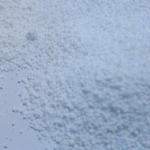 Ammonium polyphosphate is an organic salt of polyphosphoric acid and ammonia. As a specialty chemical it is used in many different key industries and most commonly as a flame retardant. The product is halogen-free, non-toxic and environmentally friendly. There are generally two different types of ammonium polyphosphate; the exact variant is determined by the chain length and polymerization degree of the chemical. Under proper storing conditions it has a shelf life of 24 months and is most often available in 25kg woven bags.
Ammonium polyphosphate is an organic salt of polyphosphoric acid and ammonia. As a specialty chemical it is used in many different key industries and most commonly as a flame retardant. The product is halogen-free, non-toxic and environmentally friendly. There are generally two different types of ammonium polyphosphate; the exact variant is determined by the chain length and polymerization degree of the chemical. Under proper storing conditions it has a shelf life of 24 months and is most often available in 25kg woven bags.
The two types of Ammonium polyphosphate and their usage
How stable they are, meaning how water-soluble and at which temperatures they begin to decompose, shows the difference between the two types of ammonium polyphosphate. Generally there exists ammonium polyphosphate phase I and phase II. Phase I exhibits a shorter and more linear chain length, while phase II displays a high polymerization degree. Used in an intumescent coating together with other chemicals, both can be used as flame retardants.
When in phase I, the chemical begins decomposing at temperatures above 150°C, meaning they are less thermally stable and highly water soluble. As such they are mainly used as flameproof coatings in the construction industry, for trains and ships, fibers and fiberboard, paper, wood and plywood, and cables. The different variants of phase I are KYLIN APP1, KYLIN APP100 and KYLIN APP111.
Phase II shows a higher thermal stability than phase I. It starts decomposing at temperatures above 300°C and can be used in solvent and water based intumescent coatings, various types of systems like rubber and PU foam, expendable fireproof textiles and coatings, woods, polymers and many others. The variants of phase II are called KYLIN APP201 & KYLIN APP203 (modified with Silane), KYLIN APP203, KYLIN APP202, KYLIN APP231 and KYLIN APP226.
High quality provider for Ammonium polyphosphate
Ammonium polyphosphate can be bought from high quality suppliers, who often work with a global network of facilities on different continents. Like this they are able to provide a culturally sensitive team, which handles the business culture around the world with ease. For these companies the high quality of their products should be of utmost importance. To ensure this quality good companies should exhibit a specific knowledge in their production, handling and logistics of specialty chemicals including Ammonium polyphosphate. Additionally they should only work with the highest standard requirements concerning the quality and safety protocols for their products.
